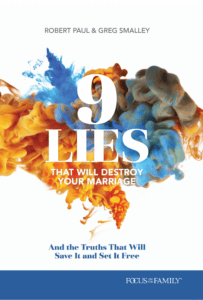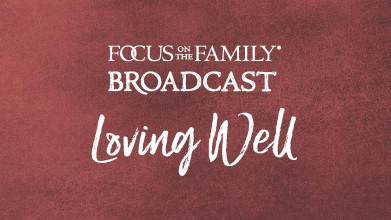Preview:
Dr. Bob Paul: Our marriages in the church as a result of our knowledge and our relationship with Christ should be materially better, different than those that are not walking with Christ.
End of Preview
John Fuller: Well, having a good marriage is a great goal, but do you sometimes feel like it’s really difficult to achieve. We have some encouragement for you today along those lines on Focus on the Family. And your host is focused president and author Jim Daly. I’m John Fuller.
Jim Daly: John. We have a fascinating message today from Dr. Bob Paul, of our Hope Restored Marriage intensives, and his wife, Jenni. They’re gonna help us to see how hidden issues from our past can sabotage our marriage and why we can often feel like all of our disagreements end up covering same ground. And they’re actually going to dissect one of their recent arguments point by point so you can hear what they were feeling but not really saying.
John: Yeah. And just like an iceberg, 90% of the problem seems to be under the water line. And, uh, this is gonna be instructive and very helpful. Here’s Bob Paul and his wife, Jenni, speaking at an event for supporters of Focus on the Family.
Dr. Paul: We are so excited to be here with you guys. We have the opportunity to be part of something miraculous that is happening, uh, through Hope Restored, through Focus on the Family every- … single day. And, guys, we get that we would not be able to do this if it wasn’t for you. I hope you know how much we feel, uh, your support and your partnership with us. Um, God is using you in amazing ways. And the miracles that we see taking place at Hope Restored every single day are astounding. And you know, the interesting thing we’ve learned over the years is it’s virtually never the people that are the problem. We are led to by, by well-meaning people. We are led to pursue ideas and strategies for our relationships that cannot work. And we don’t realize that, because they’ve hold to us by people that we’ve trusted. And we have people coming to us every week with that going on. And we get to unravel that. And many times there’s spiritual issues that are there. And we’re mostly working with Christians, but it’s so interesting I get the opportunity to tell you that a few weeks ago, I was working with a couple. And the guy has known the Lord for many years, known of him, practicing self-professing Christian, studying the word. But what he discovered in the intensive, and this isn’t that uncommon, was that he actually didn’t understand what it meant to have a personal relationship with Christ. I mean, he is in… Most, everybody would think of him as a believer. And I had the privilege, again, to lead this man to the Lord in a group. And he was, he was there for counseling for his marriage. And he found the Lord. and you gotta believe that that’s gonna make a major difference in his relationship. So we at Focus have been having the opportunity for many years, over 22 years now, to have what it’s more or less like a la- marriage laboratory, ’cause we have couples that are coming in severe crisis and they’re hurting. They’re motivated because they’re in pain. And we have been learning so much about God’s design for marriage and what happens and what it looks like when people get outta line with God and are working contrary to his design. And they’re confused because, they don’t understand because they’re believing and they’re pursuing what they’ve been taught, and they don’t understand why it’s not working. And as a result of what we’ve learned and the tools and the techniques that we have, we have, to my knowledge, the highest success rate in the world, working with couples who were in crisis.
Audience: Applause.
Dr. Paul: And we see miracles occurring. Yeah. Give God a hand for that. To date, we’ve worked with over 9,000 couples from every state in the United States in over 30 foreign countries. And I just sit back in awe.
Jenni: Mm-hmm.
Dr. Paul: So these lies have resulted in us, Greg Smalley and I produced a book last year, 9 Lies That Will Destroy Your Marriage: And the Truths That Will Save It and Set It Free. And that’s the, and the, the model that has emerged over these years is embedded in this book. And the lies are on the surface. And then we show how the truth actually can be a source of restoration, of healing, of growth, and of discovery. So today what Jenni and I wanna share with you-… is something that we’ve realized is actually a way that people get lost and misguided. And it’s really common, because what we want to share with you is something we’ve learned that is underlying all conflicts in marriage. Everybody is dealing with this exact cycle. The details will be a little different because we’re different.
And you are different from us, but the cycle itself that is underlying it is true for everybody. When we discover this, we didn’t know it applied to everybody. And I’m telling you, when you finally realize, you’ve been led to something, you’ve been given something that applies to everybody, it’s gold. So what we want to do is spend a little bit of time of, um, unpacking that for you and helping you to see, like we’ve learned, why when you get into conflict with your spouse, it virtually doesn’t matter what you’re arguing about, there will be an eerily familiar feeling to it. It’s like, wow, we’re talking about something different. We’re arguing about something different. Why does it feel so much like the last time? And we want to be able to flesh that out and let you see that.
Jenni Paul: You know, that’s because, uh, the problem is rarely the problem. A conflict is more than the topic and the process. Uh, there’s a process going on beneath the surface. In fact, we kind of like to look at it this way. The issue on top is not the whole issue.
Dr. Paul: And that’s the part we see. The part that we see commonly going on between us is only the tip of the iceberg. There’s so much more that really matters that’s going on below.
Jenni: So what is going on beneath the surface? Uh, we’re going to show you, give you kind of a little peek about a conflict. Well, we have lots of conflicts. So we’re gonna just pick one. Okay. (laughs) One conflict. And we’re gonna use that. We’re gonna start with the above the surface issue. And then we’re gonna go deeper with it and kind of take you with us. All right. So, um, this issue started because I was playing a game on my phone. And this game happened to have teams. And usually just a person kind of makes up a team and becomes a leader. It’s not like any qualification. So I’m on this team. And as I’m, as I’m playing on the team, there’s 50 people. I notice like 20 of them are not playing. And I’m like, wow, I wonder what’s going on. I’m kind of new to this and such. And so chatted in the chat box, hey, you guys, you know, I noticed you weren’t playing. Is there anything I can do? Well, the leader wasn’t really happy with that. And she disciplined me in the chat box in front of everyone.
Dr. Paul: Yeah. It was public.
Jenni: It was public. And so I was like, oh, wow. I’m not six years old. (laughs) And I’m not her child. That was really, you know, hard. So I just, you know, chatted back and said, um, you know, just encouraging them, no big deal. And she, uh, chatted another one back that was even more severe. And I was like, wow, that was painful. So I told Bob, I was like, Bob, man, can you believe what she said? I mean, first it was like I was six years old. And this one’s more like two. You know, like I’m an out of control, you know, two-year-old. And um… So anyway, so Bob said-
Dr. Paul: So I, I see my wife hurting. And, you know, she’s clearly disturbed by this. So as a normal male, not leaning on any of my knowledge as a therapist, (laughs) what do you think my response was? Well, I wanted to come up with something to help fix the problem. Okay. Now, when I, when I’m in my, my professional mode, I know better than this, but in that moment, I was just being Bob, the husband, and I see my wife hurting. So I thought maybe it would be helpful to help her to think about what might have been going on for this gal, you know, so that she would be able to maybe just not take it so hard and so forth. And inaudible]-
Jenni: And it comes out.
Dr. Paul: It didn’t land well.
Jenni: It didn’t all because it came out like I had said something that was wrong, and she was right in reprimanding me. That’s how it came out. And so now, notice that we’re gonna have a conflict based on, on that belief system that happened between the two of us. But the, the whole issue started outside of the marriage. You know, often when conflict happens, it’s something that happened with the kids or something in the car, something at work. And then you get home, and you start sharing about it. And something below the, uh, the iceberg system, you know, goes on. So we started into an argument and it kind of looked like this on, on what we give the couples, the charts.
Dr. Paul: Yes. So what we’re gonna show you now is what we understand in hindsight was going on below the water line, because obviously there was plenty going on for each of us that we were oblivious to at the moment. So we’re gonna take you below the water line for Bob and Jenni. So, um, this is what we call a reactive cycle. Okay? And, um, as you can see me at the top there, um, I’ve got a series of, of fears, I know that that’s relevant. Obviously, here we call them buttons, triggers, things that, you know, you, you, we’ve all got them. You cannot not survive any length of time in this fallen world without getting stung. Okay? So we all acquire these bruises, these wounds along the way. And here’s some of mine. I, I hate feeling controlled. I hate feeling helpless and powerless. I hate feeling inadequate, mis portrayed or misunderstood. And I react even in the, the anticipation of feeling those things. I hate those feelings enough. When the button gets pushed, I will knee-jerk react. It doesn’t take any thought, any deliberation. I will do things, like I will complain, get defensive, go into fix-it mode lecture, and talk about who’s right and who’s wrong. Now, what I really want, however, is to feel accurately portrayed. I like to feel successful. I hate failure. Uh, I love feeling of experience of partnership, uh, passion, and, uh, want to feel wanted. So that’s a little bit about what’s going on below the surface for me. How about for you?
Jenni: I mean, I’ve got a lot of buttons, but, uh, I don’t like being controlled, uh, suppressed, invalidated, judged, and ignored. And typically, when those get hit, uh, I react, uh, sometimes in anger or blame, I might get defensive and explain myself. Uh, I might judge, or I might go to who’s wrong or who did what, who, you know, right wrong kind of a thing. Really, really what I want in the relationship is I want to feel heard, and I want support, I want approval to exist. Uh, I want value to exist. And I want validation of who I am.
Dr. Paul: So here’s… Now, you know, a little bit about us.
Jenni: (laughs)
Dr. Paul: That’s just… There’s plenty more than that, but we had to condense it to fit it onto our little map here. All right. So this is what happens. So Jenni is reacting. And I see that she’s upset. And when… And, and I feel this in a lot of different ways, but it’s always worse if it’s anyone of the three most significant women in my life.
Jenni: (laughs)
Dr. Paul: My wife or my two daughters. I don’t manage that well. I manage tears. We have Kleenex all over the place in my office. I’m, I always tell people their tears are welcome. And I really believe that, unless it’s my wife or my two daughters. And then inside, I start freaking out out, because I love these people and they matter so greatly to me. So I see that, and I don’t know what to do. And I, and it taps my helpless powerless button. And I instantly, without even thinking, go into fix-it mode. Now here’s where it gets weird. And this is what’s so bizarre that this happens with couples all the time. When I go into fix-it mode, what happened to you?
Jenni: Well, for me, when he goes into fix-it mode, I feel judged. I feel like he was telling me that I was the one at fault and I had done something. And when I started to, you know, react to that and started to talk to him and such, I started to, the words that came out were defensive words. I began to explain myself. That’s really what being defensive is, is when you just start explaining what you did and such. I’m like, “Well, you know, she, I didn’t really say anything wrong. And she was the one that wrote down those statements and stuff. And I was being really kind on the chat. And I just kind of went into defensive mode.”
Dr. Paul: And I’m, since I’m trying to be helpful, and clearly it wasn’t being perceived as helpful, I feel immediately misunderstood. So my misunderstood button gets pushed.
Jenni: Yeah. (laughs)
Dr. Paul: And then I get defensive because I wanna explain to, hey, no, no, no. That’s not what I meant. Which pushed her button.
Jenni: Yeah. So I feel like, well, he’s not listening to me. So I feel invalidated. What I just said is completely inda- invalidated. And then I go into explaining who’s right and who’s wrong. And, and I’m not talking about the lady on the game, I’m talking about us. (laughs) He’s wrong and I’m right. So…
Dr. Paul: Yeah. So, so you can kind of see how this goes. This is what is so bizarre about this cycle. And I’m not, I don’t wish, I don’t know how it gets this way and why it’s this way, but just know it is this way for everybody. And we have couples… And we, and we, we took it in super slow mo now. Okay. It really slowed it down. But, guys, honestly, when this gets rolling between couples, it reminds me most of a 4th of July pinwheel. You know, you like the fuse, and then all of a sudden, they start to go and it’s spinning fast and sparks flying.
Jenni: Mm-hmm.
Dr. Paul: And that’s common.
Jenni: Yeah.
Dr. Paul: Now, sometimes couples are not like this, and it becomes like a cold war, and it’s quiet, but it’s the same cycle underneath it. And it’s amazing how that happens.
John: You’re listening to Dr. Bob Paul and his wife, Jenni, on Focus on the Family. And you can get a book that Dr. Paul co-authored along with Dr. Greg Smalley. It’s called 9 Lies That Will Destroy Your Marriage: And the Truths That Will Save It and Set It Free. We’re making that available for gift of any amount today to the ministry of Focus on the Family. Just call 800, the letter A, and the word FAMILY. (800) 232-6459. Or donate online and request that book at focusonthefamily.com/broadcast. Let’s return now to more from Bob and Jenni Paul.
Dr. Paul: So what’s actually going on? Okay? Underlying this, what’s really happening is that our brain processes emotional fear in the same way as physical fear. When we feel afraid, it doesn’t even matter if something’s actually there, the thought of something that worries us triggers the same brain process. We call, it’s what we call an amygdala hijack. The amygdala is a gland in your brain. And when it gets triggered, it sends a message out that, that releases hormones like, like, uh, adrenaline and so forth, that readies us into our fight or flight mode. Okay? And, um, really, what happens is there’s an amazing shift in blood flow. Any guess where the blood flows to? If you’re gonna go into fight or flight mode, it goes to your arms and your legs to get you ready to fight or flee. Where does it go from?
Audience: Your brain.
Dr. Paul: Your brain. It leaves your brain to go to your extremities. You are physiologically handicapped to think clearly in that moment. There is no way that you can think clearly when the blood has left your brain. Okay? And emotional intelligence goes out the window. So what’s actually going on then with these buttons.
Jenni: Yeah. Um, what is it that’s getting set off in you? And basically, buttons are past wounds that we, we can ha-have new buttons develop as we grow, but typically we bring most of our buttons with us into the relationship. So those are-
Dr. Paul: I came with a pack of them to our marriage.
Jenni: (laughs) Me too. Um, so those past wounds that we feel when someone bumps into them and when they talk to us or something that they may do. It’s kind of like if Bob had a bruise on his arm and then I walked by him and I happened to hit the bruise. Now he might say to me, Jenni, golly that hurt. Don’t do that.
Dr. Paul: Yeah. What do you think I’m thinking at point?
Jenni: Yeah.
Dr. Paul: I’m going, I, I feel the pain and I’m going, ouch, you hurt me.
Jenni: Yeah.
Dr. Paul: That’s immediately with cause and effect. Right? But what’s the truth? Did she hurt me? No, she just bumped my bruise. The bruise, the wound was already there. She tapped it in, sure, there is a bit of a causal effect, but the magnitude of what I feel is greater because there was a pre-existing wound. And most of the buttons that you possess, you brought with you to the party. And they get tapped regular by your spouse. And do you have any guess who is more skilled at pushing my buttons than anybody on the planet?
Jenni: I’ll give you a hint. (laughs)
Dr. Paul: (laughs) Now, why do you think that is? Because she wants to hurt me? No. The truth is because nobody is closer. I don’t let anybody get even close to the control panel. And she’s so good at it. She frequently doesn’t just push a button. She just leans on the whole control panel, all the buttons depressed simultaneously. And my head just spins in place.
Audience: (laughs)
Dr. Paul: Okay? But it’s because she’s got access to it. And same thing with her. I have access ’cause she lets me close to those tender, vulnerable spots in a way that nobody else on the planet does.
Jenni: Yeah. So because buttons are our wounds. Um, we actually become afraid of having those pushed. For instance, mine are, that I’m afraid, I, I kind of protect and I, I get afraid of being controlled. I might be afraid or have a tender kind of heart for being, uh, supported. I might, you know, with approval and valued and validation. So those are kind of tender spots for me among other ones. (laughs) But, um… So what we think though is that, like Bob said, is that he pushed my button. And so then I have this external reaction above water stuff that goes on and start blaming him for pushing my button. What, what we try to tell couples is that instead of blaming the, your spouse, is that you actually can feel a button go off. It actually, uh, kind of makes your, you might get like, um, a feeling across your brow or, or palpitations in your heart, or you get a flushed feeling about you, or you get upset and kind of, you feel that energy of anger coming on you. So when you feel that you can actually go to the Lord instead and say, oh, my button just got pushed. I’m gonna take some time and talk to God about this.
Dr. Paul: Yeah. So what we teach in the intensive, obviously, understanding the reactive cycle doesn’t actually take you to a better place, but it does help people to identify what’s going on so that this unconscious reactive spin can be turned into something conscious. And once you are aware, like Jenni just said, you go, whoa, we. I am triggered. I am stirred up. And we ask clients all the time to say, okay, what happens in your body that’s the tipoff that you had a button pushed? How do you know? Uh, ’cause it… And it’s a little different for everybody. We literally go from client to client when we’re in a group and say, so what physiologically happens for you? Because it’s like the red light flashing on the dashboard and you say, whoa, I am stirred up. And then you wake up and you become conscious. And then what we want people to see is what the options are different than just continually reacting in the unconscious spin. What alternatives do you have that you could do that would be more righteous, more loving, more caring, more true to who God created you to be. More Christlike. So this is just something to wake people up to what’s happening below the water line, so it opens up an array of possibilities and alternatives to be more righteous and to create a better, more satisfying relationship.
Jenni: So when our button gets pushed, a lot of times, what we’re feeling inside of us is what we really want also at the same time. Oh, I wish we had this in our marriage. My list of wants are that I wanna be heard, supported, approved, valued, and validation. And typically, I have like three pages of wants. Okay.
Dr. Paul: (laughs)
Jenni: But, uh, (laughs) but what we have a, have come to find out that what your wants are, are those things that God has given you, that you are passionate about. So it is not the responsibility of someone else to give you your wants. Instead, we can get to know our wants, find out what God has given us that we are passionate about, grow those in the Lord, and then bring those into our relationship, our family, our community, and our world. That’s what our wants are. I know it’s really, really hard to not try to get your wants met from your spouse or even your kids and your friends, but it is very, very valuable.
Dr. Paul: And to, and to just reiterate what Jenni’s saying is I think it so powerful. And we didn’t realize this at first. A lot of these things we’ve just stumbled onto, and we’ve had these divine, uh, inspirational moments where we realize that we just tapped into something that’s true to God’s heart and God’s design.
Jenni: Mm-hmm.
Dr. Paul: And what Jenni’s saying that I think is so worth repeating is that the, the things that are the desires of our heart are longings of ours because they reflect something that God created in us. The fact that she wants to be heard is because she values being heard. So she is a person who naturally listens really carefully to people, because that’s a reflection of who God created her to be. She wants to feel supported, and she is very supportive of others. She wants to feel approved. And it’s amazing how much affirmation and approval Jenni’s capable of giving to people, because that’s reflective of who she is, not just what she wants from me and from others.
Jenni: I actually, when I learned this, I actually was not good at hearing others. I would is really good at talking. And when I, when the Lord really revealed this to me and he showed me that, um, that he’s really good at listening, because when we pray, how much of the conversation in prayer is, uh, us talking to him? Yeah. So we don’t do a real good job of listening to Lord. And he’s a really good listener to us. And he said, I want you to become a really good listener. And when I did, I felt so more balanced. Because I wanted to be heard. And now I was spending time learning how to hear others. And it was really a passion of mine that I had not cultivated. And so that’s another thing that we do, is really encourage people to cultivate their wants.
Dr. Paul: So for over 22 years, we have been learning now so many things about God’s design for life, God’s design for marriage, what works and what doesn’t. And what we’ve realized is, is that it doesn’t just work for couples in crisis.
Jenni: Mm-hmm.
Dr. Paul: It actually works… These ideas, these principles, these tools work every bit as well, and maybe better for couples who are just doing good and want to do better, for the average couple out there. So what we’ve been doing now for years is trying to figure out ways to package this information in books and in, and in events and so forth to get the word out to the masses, because, guys, this is kingdom work. What we need more than anything is for the church to demonstrate that what we claim to be true about a relationship with Jesus Christ is not just true in theory, but it is true in real-time.
Jenni: Yeah.
Dr. Paul: Because our marriages in the church as a result of our knowledge and our relationship with Christ should be materially better, different than those that are not walking with Christ.
John: Dr. Bob Paul of the Focus on the Family Marriage Institute and our Hope Restored intensives on today’s episode of Focus on the Family.
Jim: Well, I really appreciate the transparency Bob and Jenni shared in this message. And I hope you found some insights for your own marriage. We’re running out of time today but let me quickly mention that we have a great follow up resource to this broadcast. It’s a book written by Bob Paul and Greg Smalley called 9 Lies That Will Destroy Your Marriage: And the Truths That Will Save It and Set It Free.
John: Yeah. This is a great book. And some of the lies that Bob and Greg identify are those that tend, uh, to be believed by a lot of us like, oh, they lived happily ever after, or all you need is love, and, uh, our differences are irreconcilable.
Jim: Yeah. And those lies can be very destructive. And this book is published by Focus on the Family. And I really want to get it out to as many couples as possible. Uh, so we’ll send you a copy of 9 Lies That Will Destroy Your Marriage for a donation of any amount. And if you can’t afford it, get in touch with us. We’ll trust others will cover that. Remember, when you get the book from Focus, the proceeds go right back into ministry, not into the pockets of shareholders. Support our work to enrich marriages by ordering the book today.
John: And you can reach us when you call 800-A-FAMILY. (800) 232-6459. Or donate online and request your copy of the book at focusonthefamily.com/broadcast. While you’re online, look for an article that Bob and Jenni have provided that illustrates the cyclical nature of their argument and the hot buttons that got pushed along the way. It’s really helpful to see that. It’s free and it’s right there on the website. On behalf of Jim Daly and the entire team, thanks for joining us today for a Focus on the Family. I’m John Fuller, inviting you back as we, once again, help you and your family thrive in Christ.























